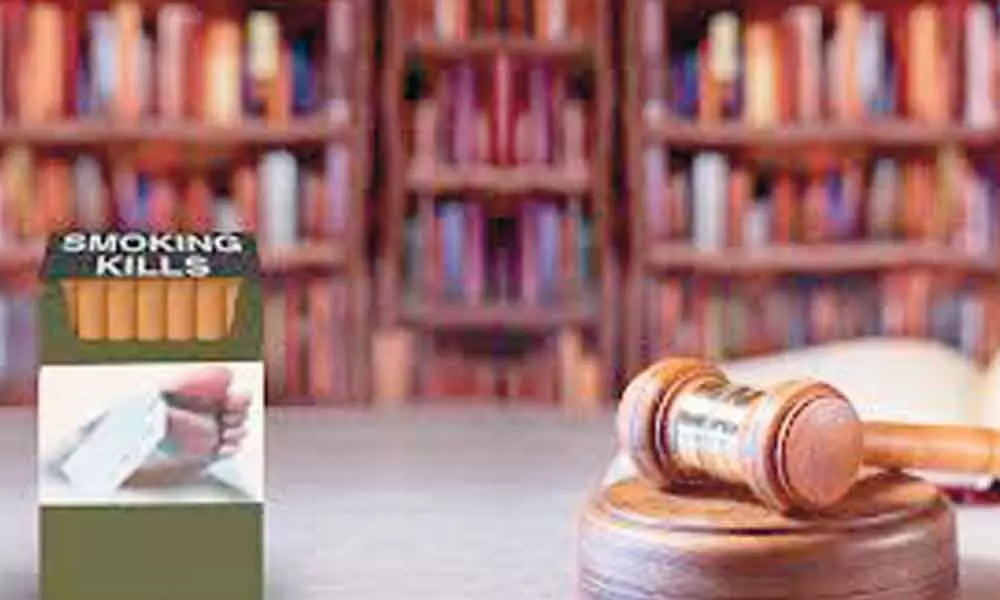Live
- Taluk Guarantee panel
- Uber Launches Uber Moto Women for Safer and Flexible Rides in Bengaluru
- ‘Fear’ pre-release event creates waves
- Champions Trophy 2025 Host Change? Indian Broadcaster's Promo Sparks Controversy
- Nabha Natesh introduced as Sundara Valli from ‘Swayambhu’
- Aamir Khan praises Upendra's ‘UI: The Movie’ ahead of its release
- Celebrations: Keerthy Suresh ties the knot with Antony Thattil
- Indian scientists develop flexible near-infrared devices for wearable sensors
- Wordle Answer and Hints for Today (December 12, 2024) – Solve Wordle #1272
- Kiara blazing through fashion and film
Just In
NLSIU report finds loopholes in tobacco control law


NLSIU report finds loopholes in tobacco control law
A new report titled “Tobacco Control Law in India – Origins and Proposed Reforms” released by the National Law School of India University (NLSIU) on Tuesday revealed that there were glaring gaps in the existing tobacco control legislation, Cigarettes and Other Tobacco Products Act (COPTA) 2003.
Bengaluru: A new report titled "Tobacco Control Law in India – Origins and Proposed Reforms" released by the National Law School of India University (NLSIU) on Tuesday revealed that there were glaring gaps in the existing tobacco control legislation, Cigarettes and Other Tobacco Products Act (COPTA) 2003.
The report noted that despite a ban on smoking places in India restaurants, hotels and airports have allowed a designated spot at their premises.
"Tobacco advertisements and products are prominently displayed in stores and kiosks despite a ban on advertising. The existing penalties under COTPA 2003 are not sufficient and the sale of single stick cigarettes and other loose tobacco products is the norm in India. Emission yields which are mentioned on cigarette packets often give a misleading impression are some of the gaps in the existing tobacco control legislation COTPA 2003, which makes it ineffective for regulating tobacco consumption and exposure to second hand smoke in India," revealed the report.
The report was released by the NLSIU and submitted to Union Ministry of Health and Family Welfare, analyzed the COPTA (Prohibition of Advertisement and Regulation of Trade and Commerce, Production, Supply and Distribution) Act, 2003. This report is intended as a comprehensive analysis of COTPA 2003, identifying the gaps therein, and proposing reforms which are in consonance with the recommendations of the parliamentary committees, best practices adopted by other countries and the guidelines specified under the global public health treaty on tobacco control, World Health Organization Framework Convention on Tobacco Control (WHO FCTC).
"The harmful effects of tobacco use are well established and accepted globally. Through this report the Chair on Consumer Law and Practice, NLSIU has made a rigorous effort to identify gaps in the existing tobacco control laws of India (COTPA 2003). The report recommends legislative reforms based on the global public health treaty, FCTC, to which India is a signatory as well as best practices adopted by other countries. We hope that the Government will consider these recommendations while proposing a comprehensive COTPA Amendment Bill", said Prof. (Dr.) Sudhir Krishnaswamy, Vice Chancellor, NLSIU.
NLSIU report has proposed the prohibition of designated smoking areas at public places by removing the provision that allows for any smoking areas or spaces. It also demands prohibition of all point of sale advertising including the tobacco product displays in stores and kiosks.
"Specify that advertising is banned on new internet based medium and prohibit all tobacco company sponsorship including corporate social responsibility activities. Prohibit the display of emission yield figures and regulate contents and emissions including a ban on all flavored tobacco. Allow for greater regulation of tobacco packaging and increase the age of sale from 18 to 21. There should also be a prohibition on the sale of single sticks, loose tobacco or smaller packs and increase the penalties for violations," the report proposes.
"Medical science clearly recognises tobacco as the single most significant cause of mortality and morbidity across the globe. The State`s primary duty is of improving and protecting public health under the Constitution of India. The recommendations from the NLSIU report need to be implemented by the Ministry of Health and Family Welfare immediately by amending COTPA 2003 if India is serious about reducing tobacco use and protect Right to Health guaranteed by Article 21 of the Constitution of India," said Former Chief Justice of India Hon'ble Justice M N Venkatachaliah.
COTPA was introduced in 2003 to regulate the availability and advertising of most forms of tobacco products in India to discourage the use or consumption of tobacco products and to improve public health in general. The Act intended as a comprehensive law on tobacco control was adopted over 15 years ago but with the passage of time, lacunas in the Act have become apparent and proved to be a major challenge in its effective implementation.
"There is ample evidence about tobacco products being the killer. These should be made inaccessible to save Indians from a lifetime of misery and suffering. It is critical to strengthen the country's tobacco control law to galvanize the ongoing efforts to check the tobacco epidemic in India, especially during these challenging times," said Dr Vishal Rao, renowned oncologist and Member of High Power Committee on Tobacco Control, Govt of Karnataka.
India has the second largest number of tobacco users (268 million or 28.6% of all adults in India) in the world – of these at least 1.2 million die every year from tobacco related diseases. One million deaths are due to smoking, with over 200,000 due to secondhand smoke exposure, and over 35,000 are due to smokeless tobacco use. Nearly 27% of all cancers in India are due to tobacco usage. The total direct and indirect cost of diseases attributable to tobacco use was a staggering Rs 1,82,000 crore which is nearly 1.8% of India's GDP.

© 2024 Hyderabad Media House Limited/The Hans India. All rights reserved. Powered by hocalwire.com






